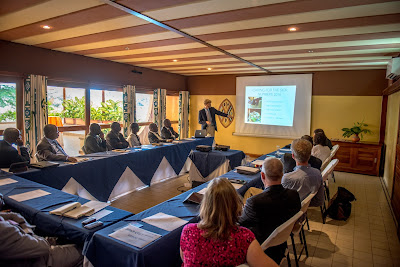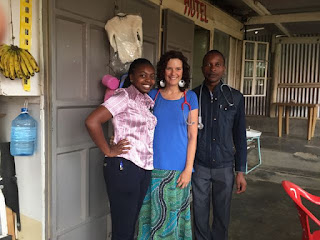It is the darkness of the situation that makes belief a necessary prerequisite of walking in.
A week ago, Scott landed in San Francisco to navigate his dad's failing health and his mom's anxious grief and his own weighty loss. The first few days carried little clarity. Confusing options, conflicting advice. Tomorrow, however, he will begin his journey back to our home in Kenya, with much peace. A lovely and reputable care facility with an opening for his dad; solid steps accomplished by his mom and him; hours upon hours of work and listening unfolding in progress.
A week ago, I was slogging through my first days back at work after our trip, the massive influx of patients who had waited through a more-than-three-month delay in care filling every bed at least double. One day I noted that the Newborn Unit number (39) and the Paeds ward (61) exactly added to 100. When you have a hundred patients being cared for by a team who resents return, who feels betrayed by the government and is talking of their next strike, who view medicine through demoralized eyes and dream of alternate careers, who come late and leave early so all work has to be compressed into a 3-5 hour day . . . well, you have to rush. You desperately try to find the impending disasters and stave off the nearest deaths. In the last 9 days we lost 9 patients: a 6-month old with Down Syndrome whose critical heart lesion had not been previously noted, a malnourished 3 year old who may have also harbored a malignancy, a 520 gram (1 pound) 24 week preem who tempted us to hope when she was perky and pink for two days, a 1.2 kg (2 1/2 pound) 28 week preem who looked desperately starved for air from day one but lulled us into thinking he would make it after ten days on CPAP (our bubble improvised oxygen delivery under pressure), an infant with croup who seemed to be responding to treatment and then was dead, a convulsing baby whose difficult birth left her brain damaged, a child with cerebral palsy who could not shake a severe pneumonia, a newborn with signs of a congenital infection causing heart and bleeding problems, and another baby the intern texted about because she didn't see why the nurses wanted to admit and next thing I heard the baby had died. Add to that pummeling of futility some serious push-back from resentful residents and the lingering potential that it could all implode again . . it was dark. Today, however, no one died. We had reasonable round with some good decisions and teaching; we found abscesses to drain, a culture-positive meningitis, x-rays most likely showing TB, new diagnoses of AIDS. The trainees joined me for chai and a talk on Down Syndrome. A taxi driver we've used texted me for help and I got to see his perfectly healthy just-delivered daughter. A nurse I respect took a photo to show me a nearly chubby (more than doubled in weight) return of a baby we had admitted a couple months ago. My pediatrician colleague, my sole Kenyan counterpart, returned from a training course that had immediately followed the strike, and with her diplomatic skill and equanimity ironed out a better schedule for our team to function.
For both of us, I think God was asking for us to believe, in spite of the darkness. Like the official in John 4 who had to take Jesus at his word about his son's distant healing, then went on his way home to be met by the news that the change occurred at the very hour of his ask to Jesus. (That story really struck me this week, as we ask for our children to be healed, protected, comforted, blessed from a very long ways away, and God gave me a glimpse that this is our story too).
The new moon is a falling tinsel sliver that dips into the sunset, leaving the nights dark right now. This is the Lenten season where darkness fills the horizon, the cross looms large, evil seems to sway. This is the season when we can only walk by believing.


















































